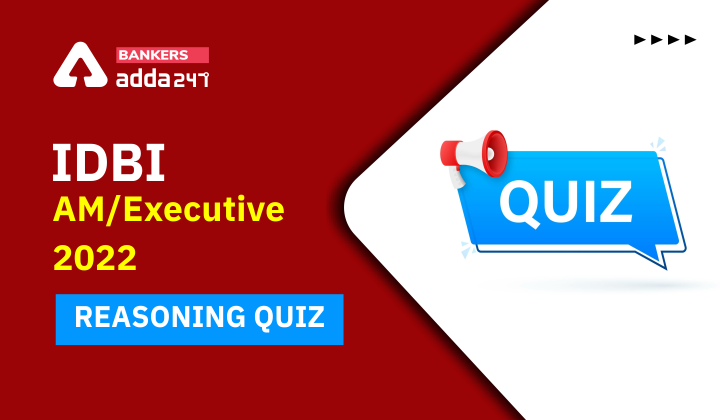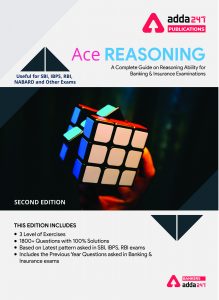Directions (1-4): In these questions, relationship between different elements is shown in the statements. These statements are followed by two conclusions:
Q1. Statements: S = P ≤ V ≤ K < Y < X, G < Q ≥ P > B ≥ L = N
Conclusions:
I. S < X
II. G < Y
(a) Only I is true
(b) Only II is true
(c) Either I or II is true
(d) Neither I nor II is true
(e) Both I and II are true
Reasoning Quiz For IDBI AM/Executive 2022 15th June CHECK IN HINDI
Q2. Statements: B < P = Q ≤ C ≤ O < T, R < N = B
Conclusions:
I. P < R
II. R > Q
(a) Only I is true
(b) Only II is true
(c) Either I or II is true
(d) Neither I nor II is true
(e) Both I and II are true
Q3. Statements: M ≤ N ≤ T ≥ O < Z = R, Y < I ≤ M > D ≥ L > P
Conclusions:
I. Z ≥ N
II. I ≤ T
(a) Only I is true
(b) Only II is true
(c) Either I or II is true
(d) Neither I nor II is true
(e) Both I and II are true
Q4. Statement: C < T ≤ V ≤ Y < O > U = E, S > Y ≤ A < Z = L
Conclusions:
I. Z > T
II. Y > C
(a) Only I is true
(b) Only II is true
(c) Either I or II is true
(d) Neither I nor II is true
(e) Both I and II are true
Directions (5-7): In the following questions, the symbols @, *, &, ! and % are used with the following meaning as illustrated below.
‘M @ Q’ means ‘M is neither greater than nor equal to Q’
‘M * Q’ means ‘M is neither smaller than nor equal to Q’
‘M & Q’ means ‘M is neither smaller than nor greater than Q’
‘M! Q’ means ‘M is not greater than Q’
‘M % Q’ means ‘M is not smaller than Q’
In each of the following questions assuming the given statement to be true, find which of the conclusions given below them is/are definitely true and give your answer accordingly.
Q5. Statements: K & E * R % V, S @ Y ! T, V * Y @ C
Conclusions:
I. S @ E
II. T * Y
(a) Only I is true
(b) Only II is true
(c) Either I or II is true
(d) Neither I nor II is true
(e) Both I and II are true
Q6. Statements: U ! W @ B * S, K @ Y & U, S % D & F
Conclusions:
I. K @ W
II. B * F
(a) Only I is true
(b) Only II is true
(c) Either I or II is true
(d) Neither I nor II is true
(e) Both I and II are true
Q7. Statements: M * T % C @ F & S, Q @ L & M, S * G
Conclusions:
I. Q @ T
II. L % C
(a) Only I is true
(b) Only II is true
(c) Either I or II is true
(d) Neither I nor II is true
(e) Both I and II are true
Directions (8-11): In the following question assuming the given statements to be true, find which of the conclusion(s) is/are is definitely true and then give your answers accordingly.
Q8. Statement: H ≥ S ≮ D > E = X ≰ C ≮ V
Conclusions:
I. S ≰ V
II. X ≥ C
(a) Only I is true
(b) Only II is true
(c) Either I or II is true
(d) Neither I nor II is true
(e) Both I and II are true
Q9 Statement: J > S = U > K, D = L ≤ T > K ≠ P < Q ≱ B = C > M
Conclusions:
I. S > C
II. B ≠ D
(a) Only I is true
(b) Only II is true
(c) Either I or II is true
(d) Neither I nor II is true
(e) Both I and II are true
Q10. Statement: M > N ≱ O = P ≥ Y = R ≮ S = Z > X
Conclusions:
I. X ≱ Y
II. P ≮ Z
(a) Only I is true
(b) Only II is true
(c) Either I or II is true
(d) Neither I nor II is true
(e) Both I and II are true
Q11. Statement: J ≥ G ≱ Y = T < R > W, L ≠ F ≱ H = R > X
Conclusions:
I. Y ≠ X
II. Y < H
(a) Only I is true
(b) Only II is true
(c) Either I or II is true
(d) Neither I nor II is true
(e) Both I and II are true
Directions (12-15): In the following question assuming the given statements to be true, find which of the conclusion(s) is/are is definitely true and then give your answers accordingly.
Q12. Statement: Q ≥ W ≰ F = R ≥ T ≮ Y ≮ K ≰ L
Conclusions:
I. F = K
II. F > K
(a) Only I is true
(b) Only II is true
(c) Either I or II is true
(d) Neither I nor II is true
(e) Both I and II are true
Q13. Statements: C < F ≤ T < V = S, K ≥ U > S
Conclusions:
I. F < K
II. S > C
(a) Only I is true
(b) Only II is true
(c) Either I or II is true
(d) Neither I nor II is true
(e) Both I and II are true
Q14. Statements: E ≥ F < T = Q > U, K ≤ C < F
Conclusions:
I. Q > F
II. K < E
(a) Only I is true
(b) Only II is true
(c) Either I or II is true
(d) Neither I nor II is true
(e) Both I and II are true
Q15. Statements: O > K ≤ Y < J, N ≤ J = Q > L
Conclusions:
I. O > J
II. L > Y
(a) Only I is true
(b) Only II is true
(c) Either I or II is true
(d) Neither I nor II is true
(e) Both I and II are true
Solutions
S1. Ans. (a)
Sol. I. S < X – True
II. G < Y – False
S2. Ans. (d)
Sol. I. P < R – False
II. R > Q – False
S3. Ans. (b)
Sol. I. Z ≥ N – False
II. I ≤ T – True
S4. Ans. (e)
Sol. I. Z > T – True
II. Y > C – True
S5. Ans. (a)
Sol. Given Statements: K & E * R % V, S @ Y ! T, V * Y @ C
On Combining: K & E * R % V * Y @ C, S @ Y ! T
K = E > R ≥ V > Y < C, S < Y ≤ T
Conclusions:
I. S @ E – True
II. T * Y – False
S6. Ans. (e)
Sol. Given statement: U ! W @ B * S, K @ Y & U, S % D & F
On Combining: K @ Y & U ! W @ B * S % D & F
K< Y = U ≤ W < B > S ≥ D = F
Conclusions:
I. K @ W – True
II. B * F – True
S7. Ans. (d)
Sol. Given Statements: M * T % C @ F & S, Q @ L & M, S * G
On Combining: Q @ L & M * T % C @ F & S * G
Q < L = M > T ≥ C < F = S > G
Conclusions:
I. Q @ T – False
II. L % C – False
S8. Ans. (a)
Sol. I. S ≰ V – True
II. X ≥ C – False
S9. Ans. (d)
Sol. I. S > C – False
II. B ≠ D – False
S10. Ans. (e)
Sol. I. X ≱ Y – True
II. P ≮ Z – True
S11. Ans. (b)
Sol. I. Y ≠ X – False
II. Y < H – True
S12. Ans. (c)
Sol. I. F = K – False
II. F > K – False
S13. Ans. (e)
Sol. I. F < K – True
II. S > C – True
S14. Ans. (e)
Sol. I. Q > F – True
II. K < E – True
S15. Ans. (d)
Sol. I. O > J – False
II. L > Y – False





 GA Capsule for SBI Clerk Mains 2025, Dow...
GA Capsule for SBI Clerk Mains 2025, Dow...
 The Hindu Review October 2022: Download ...
The Hindu Review October 2022: Download ...
 GA Questions Asked in Indian Overseas Ba...
GA Questions Asked in Indian Overseas Ba...


